Councils are a staple feature of many different Megagames. From the UN at Watch The Skies, to the Small Council at Everybody Dies, to Lenin’s Party Congresses at Red Dawn, councils come in many shapes, sizes and mechanics.
They’re also notoriously tricky places, where loud talking and dominant personalities can drown out calmer heads, and where councils can get bogged down in mechanics and struggle to impact the wider game in any significant way.
How timely, therefore, that Handforth Parish Council have held a Zoom meeting for one of the recent meetings! In case you have somehow missed the viral phenomenon which is the Handforth Parish Council Zoom meeting, here’s a highlights reel:
There are a lot of lessons that can be learned from this Zoom, for both players and designers, in how to design and take part in effective and interesting council games.
1. Your council needs a Chair
Meetings are made or destroyed by the nature of their chairperson. It needs to be down to one person to set the agenda, to move the meeting on when it’s getting bogged down, and to call votes where relevant. After Jackie Weaver kicked “Handforth PC Clerk”, she immediately moved on to determining who the Chair would be for the remainder of the meeting.
For designers, have a think about who the Chair for your council will be – the leader of a particular faction? A Control member? Will the Chair remain the same throughout the game, or is there a process for them to be rotated or replaced? Is the Chair impartial, or do they have an agenda? There are pros and cons to each of these options, and a lot of this will depend on the exact format of your council game.
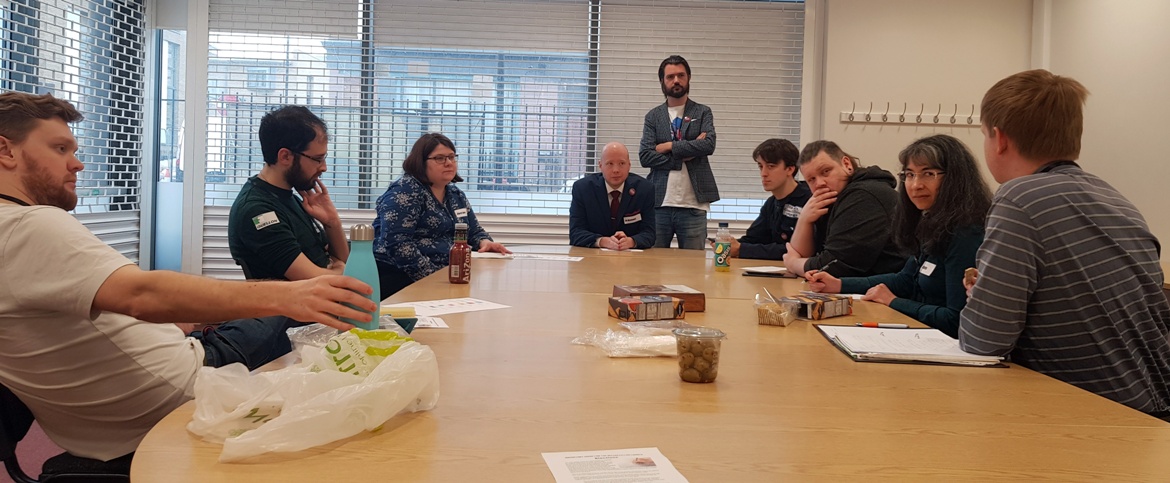
Once you’ve determined all that, consider the casting for your Chair, as that can make or break the experience of the entire council. They should be a confident enough person to command a discussion. And if they have their own agenda, they should be a fair player who won’t completely shut out other players to meet their own ends, as this could end up seriously frustrating the people they are playing against. This is a role where it is often better to cast an experienced player rather than a newbie.
And if you are cast as a Chair, the same holds true – don’t stomp all over people to meet your objectives. Consider how to meet your objectives without destroying the atmosphere in the council game. Try to ensure that all the other players get an opportunity to speak, even if they’re likely to say something that might screw you over!
2. Work out the meeting’s procedures
Overly procedural meetings are among the most paralysing experiences in life – just look how long the Handforth Parish Council got bogged down in who was allowed to raise a “point of order”.
In some games, councils are very low-mechanics and are simply talking spaces – or perhaps they didn’t exist at the start of the game, and they were created organically by player interactions. In these sorts of councils, sticking too hard to any formal meeting procedure is just going to shut down conversations. It’s normal in these sorts of councils for there to be a symbolic Chair who moves the meeting along when it gets bogged down, and usually all attendees have a single vote, though this may be changed as the council evolves.
However, some council games have a more defined structure, usually related to the tone the designer is trying to instil. This is often related to either the power level of the Chair – perhaps they’re the only person allowed to table discussion points, like in Crisis in Elysium. Or perhaps it is that some players are there in an observer capacity only, such as Press Players in Den of Wolves.
Or perhaps you want an even more rigid structure. For example, at Red Dawn on the Bolshevik team, Lenin was the only player who could call a Party Congress at all (though he was expected to at least three times in the game). What’s more, even voting against Lenin was frowned upon, and pretty much all votes in the game were coerced into being unanimous.
Some games need even stricter mechanics than these. At Everybody Dies, the Small Council was a fully mechanical game, where King Aerys (played by a Control) tabled increasingly concerning motions, and players had to work out what to spend their limited influence on voting down.
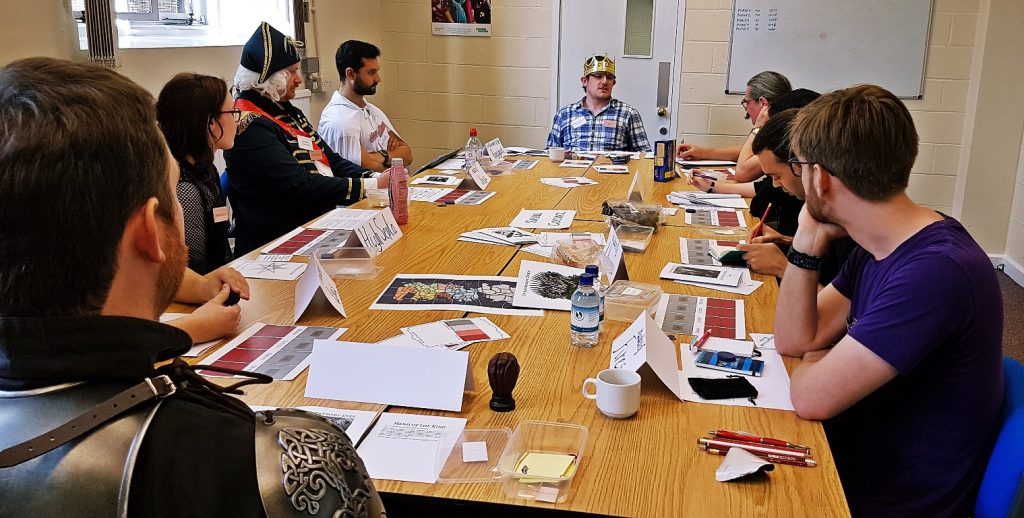
In short, don’t add additional procedure into your councils than you need. Any procedure in the game should be serving a specific purpose, whether theme-related or to do with efficiency.
3. Be considerate to other council players
From shouting to answering a call without muting, etiquette issues plagued the Handforth Parish Council meeting from start to finish. Even though you may be opposing the other players on the council, you should be respectful to them.
Filibustering and talking over people are admittedly time-honoured megagame techniques that are proven to work in councils, but they are likely to lead to real-life hurt feelings – and this is, after all, a game that is meant to be enjoyed.
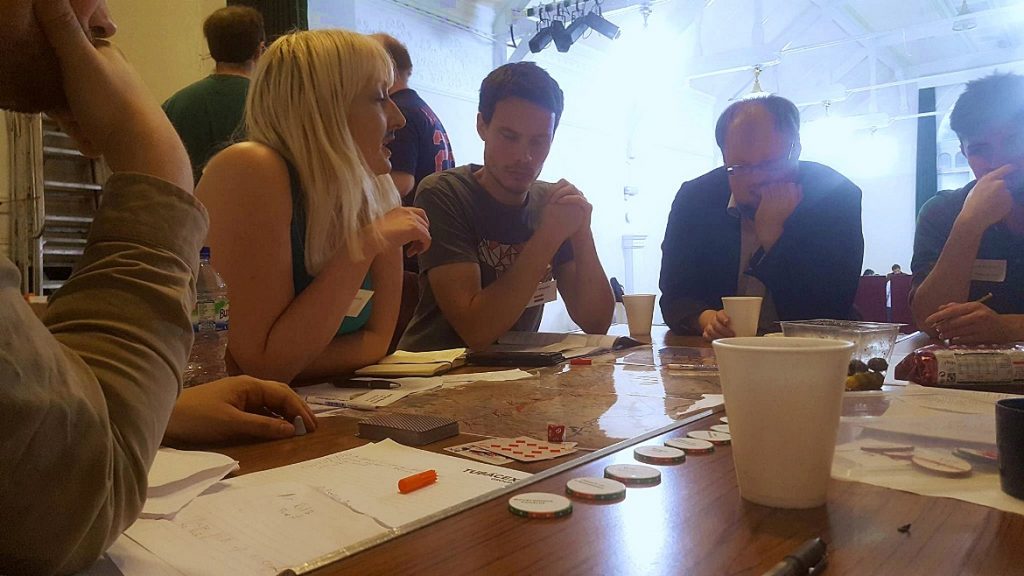
If you are a player that relies on these sorts of tactics, challenge yourself to be an exemplary council member and to try out more advanced techniques to push your cause forward. Perhaps backdoor diplomacy, paraphrasing another person’s input to change the meaning, or exercising your critical discussion skills would be more satisfying stories to tell in the pub, rather than “I shouted them down”.
4. Sometimes there’s a “Handforth PC Clerk”
In real life, if someone is as obstructive as “Handforth PC Clerk” from the Parish Council meeting, there’s often a way to boot them from the meeting. In megagames, however, if someone is being difficult then that might be part of their briefing. You can’t kick China out of the UN, even if they veto every single vote!
(Or maybe you can, if the game is Washington Conference).
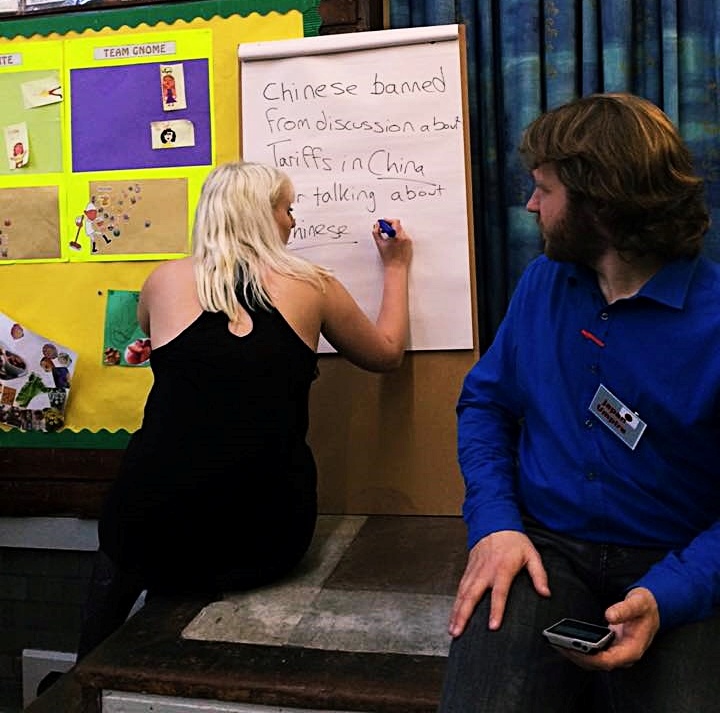
In megagames, it can be difficult to tell the difference between a player who is being uncooperative due to an opposing brief, or because they are a difficult personality. You can often pick this up based on their more casual interactions, but this doesn’t help with “method megagamers” who don’t break character at all.
That doesn’t mean that all obstructive behaviour needs to be tolerated, of course. If a player is talking over people or being rude out-of-character, the best thing to do first is to speak to whichever Control member is responsible for managing the council. If it’s a player issue, they’ll do their best to resolve it, and if it’s an intended character conflict, they’ll probably give you some indication that this is the case.
For designers, consider carefully who you put into these contrary roles, and make sure your council Control is prepared for any likely rifts within the council game.
5. Make your council matter
The highlights reel doesn’t show much about what Handforth Parish Council were trying to achieve with their meeting. But if their meeting had zero output, it would be even more pointless that a dozen adults spent an hour and a half arguing over wars of words and how to mute. Presumably somewhere along the way, they made some decisions and assigned some post-meeting actions.
Similarly, your Council needs to have an impact beyond the meeting room walls. As a designer, you should consider how decisions from the council will be communicated and implemented across the wider game. This might be done by Control tweaking trackers or resource amounts, or it might be down to players or the Press to communicate laws to the room.
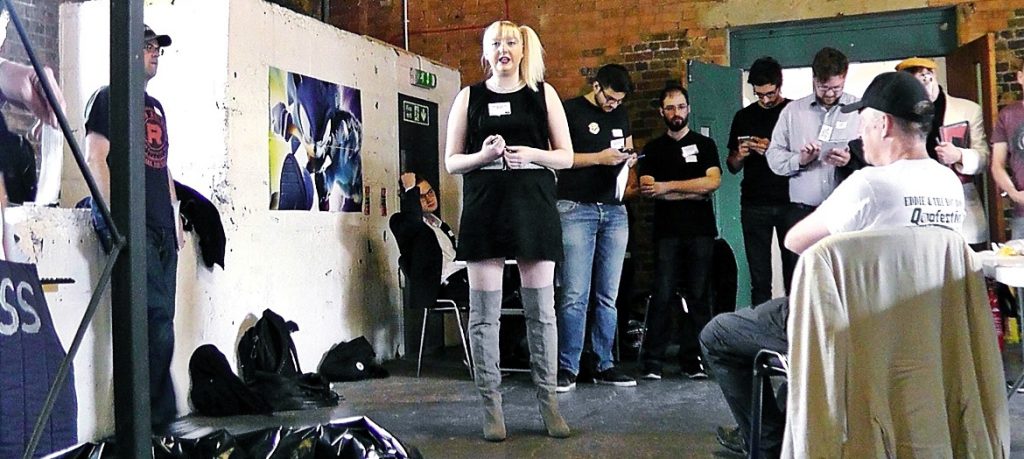
One key mistake that council players make is thinking that if they disagreed with a resolution that was passed, they don’t need to action it. Most megagames rely on council players to communicate this sort of information, if only to their own teams, and simply not passing on a message because you don’t like it risks being game-breaking. In real-life you might stonewall it, but if you’ve got a mechanical responsibility to carry a resolution out, make sure you do that before reacting to it.
Summary
Council games are one of my favourite parts of megagames. However, they can be tricky to do well, both on the designer side and the player side.
Looking to real-world examples of how to run meetings can be useful, but megagame councils are often trying to mimic specific dynamics which don’t necessarily correlate with real-life meeting practices.
One final thought: while I don’t generally agree with the Handforth Parish Council Vice-Chair, make sure that you READ THE STANDING ORDERS (or council game rules) and UNDERSTAND THEM, otherwise your fellow players may get justifiably frustrated with you.
What’s the best council game you’ve seen at a megagame? Can you think of any other tips for players or designers off the back of Handforth Parish Council’s meeting?
